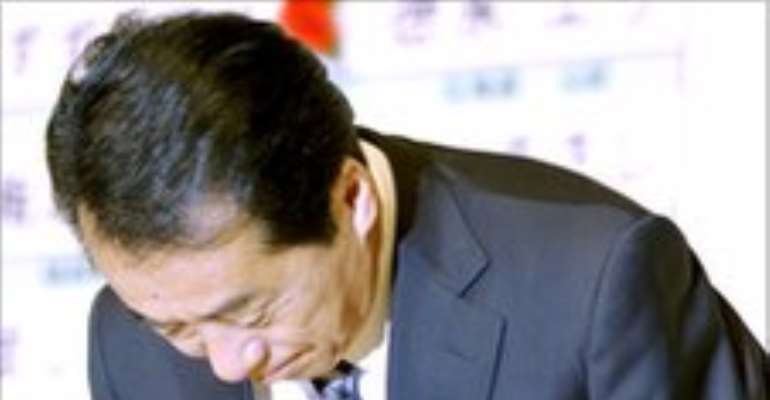JAPAN PM LOSES UPPER HOUSE CONTROL, FORECASTS SUGGEST

The Japanese prime minister is facing an election disaster as forecasts show he lost control of the upper house of parliament in Sunday's election.
The ruling DPJ party of PM Naoto Kan won just 44 seats, falling short of Mr Kan's goal of 54, it is reported.
Its tiny ally, the People's New Party, was said to have won no seats in Sunday's election, which was seen as a referendum on the DPJ's 10-month rule.
Mr Kan, who became PM only last month, has reportedly said he will not resign.
The DPJ went into the polls with a majority in both houses and will now need new allies.
A total of 121 seats, half of the upper house, were being contested in Sunday's election.
The DPJ held 62 seats not being contested, and the projected 44 wins would leave it short of the 122 majority needed, public broadcaster NHK said.
Vulnerable
The DPJ still has a majority in the more powerful lower house but its ability to govern effectively has been challenged.
The BBC's Roland Buerk in Tokyo says that what was at stake was whether the prime minister would be able to build a stable political base to tackle the massive national debt.
Our correspondent says Mr Kan must now look for allies among smaller parties and the result could leave the prime minister vulnerable to leadership challenges from within his own party.
The DPJ came to power last August, ending half a century of dominance by its main rivals, the conservative Liberal Democratic Party, which reportedly won 51 seats.
Mr Kan succeeded Yukio Hatoyama, who resigned abruptly after only nine months in office amid funding scandals and a row over an American military base.
The election campaign was dominated by the prime minister's suggestion that Japan needed to discuss the possibility of an increase in sales tax – an issue that has divided voters, says our Tokyo correspondent.
Sales tax currently stands at 5%, but Mr Kan had suggested raising this as high as 10%.
Mr Kan said the country had to make sure it avoided financial collapse.
“Japan's economy is 20 to 30 times bigger than that of Greece and its public debt is huge, so no country in the world could rescue Japan,” Mr Kan said on Friday.
Japan has been borrowing money for two decades, trying to bring its economy out of stagnation.
Official government results were not expected until later on Monday.
But Mr Kan acknowledged defeat in the morning, saying he had failed to fully explain his proposal to raise the sales tax.
Analysts said that even if the Democrats ironed out their leadership problems they would still be short of a majority.
Jesper Koll, director of equity research at JP Morgan Securities Japan, said: “We're likely to have lost another two years stuck in parliamentary gridlock rather than action.”
